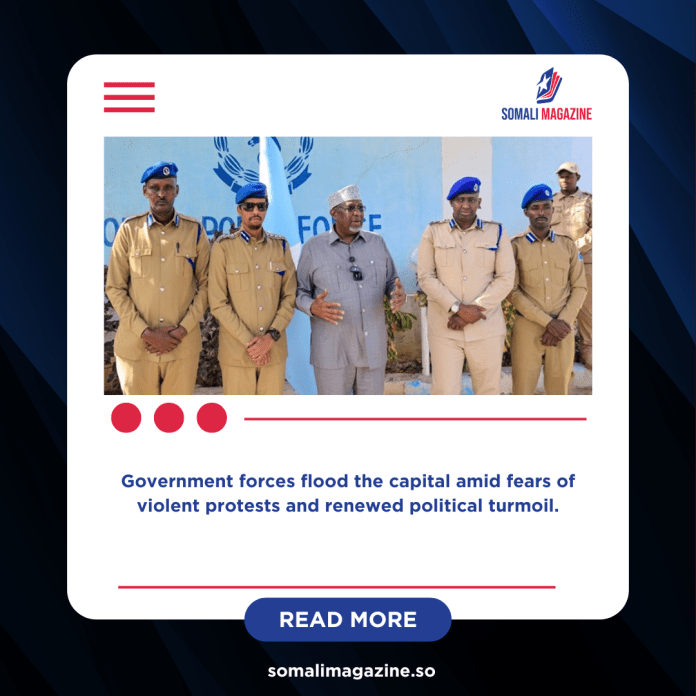Facebook Twitter (X) Instagram Somali Magazine - People's Magazine
Somalia’s capital, Mogadishu, was on edge Thursday after the government deployed armoured vehicles and heavily armed troops across key areas of the city. The show of force focused mainly on roads leading to the residences of opposition leaders, raising concerns that political tensions could spiral into renewed unrest.
The deployment followed a violent clash the day before at Warta Nabadda police station. Armed militias linked to opposition figures stormed the facility, exchanging gunfire with government forces. The fighting left casualties, caused damage to the station, and deepened the already fragile political climate.
Opposition sources claimed that the military buildup on Thursday was not simply for security but also intended to monitor political rivals and disrupt alleged smuggling of weapons into Mogadishu. Photos shared online by opposition officials showed armored personnel carriers blocking major routes, including those near Aden Adde International Airport, sparking fears that the situation could escalate further.
The move came just days after opposition leaders called for peaceful protests against what they say are illegal land grabs by senior government officials. Many residents voiced worry that the demonstrations, expected over the weekend, could turn violent if security forces confront opposition supporters.
Sheikh Adan Mohamed Nur Madobe, the speaker of parliament and currently acting president while President Hassan Sheikh Mohamud attends the United Nations General Assembly in New York, visited the Warta Nabadda station on Thursday. He condemned the violence as “deeply regrettable,” while praising government forces for their quick response that, according to him, prevented more deaths.
Madobe criticized opposition leaders for encouraging actions that risk plunging the country back into instability. “The bullets I saw at the station were even heavier than those used in the civil war,” he said. “It is shameful for this country to be dragged once again into chaos and disorder. What happened yesterday should never have been carried out by anyone who has held office and still seeks leadership.”
Prime Minister Hamse Abdi Barre also weighed in, calling Wednesday’s events a “failed coup attempt.” His remarks reflected the government’s position that the attack on the police station was not merely an isolated act of violence but part of a broader plan to destabilize the state.
In addition to addressing the clashes, Madobe announced that authorities had launched an investigation into a separate incident at Mogadishu’s Sinay market, where police officers were accused of assaulting civilians. Video shared online had shown officers beating an elderly man, sparking public outrage. Madobe confirmed that the officers involved had been arrested and would face justice.
He used the moment to stress the importance of accountability, saying that law enforcement must protect, not harm, citizens. At the same time, he urged the security forces to remain vigilant in safeguarding the city against political violence.
Madobe also appealed directly to opposition leaders, warning them not to incite confrontations. “What you are pursuing is not in the public interest,” he said. “Do not let what happened yesterday be repeated.” His message reflected growing fears that Mogadishu could once again become the scene of violent power struggles, reminiscent of the country’s troubled past.
For now, Mogadishu remains tense. With heavily armed troops positioned across the city and opposition protests looming, residents are bracing for what may unfold in the coming days. The balance between maintaining order and allowing political expression will be crucial in determining whether the capital moves closer to peace or sinks deeper into crisis.

